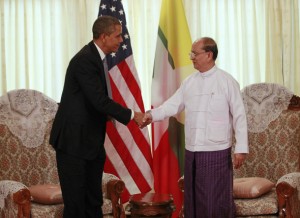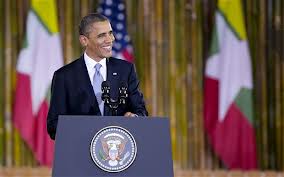Posts Tagged ‘United States’ (123 found)
Burma: Investors Need Robust Rights Safeguards
American companies investing in Burma should not let new US government reporting requirements lull them into complacency on human rights concerns. The US “Reporting Requirements on Responsible Investment” in Burma went into effect on May 23, 2013. Doing business in Burma involves various human rights risks that the US rules do not fully address […]
• • •President Thein Sein’s US Visit Branded by Broken Promises
 For the first time in nearly fifty years, President Thein Sein will visit the United States and meet with President Barack Obama today, 20 May. This follows the historic visit by President Obama to Burma six months ago. The visit is an opportunity for the White House to pressure Thein Sein to continue the reforms that have been taking place and highlight some of the concerns the United States, the international community and particularly the citizens of Burma have. The visit also represents the more troubling view that there has been a relaxing of the US policy of rewarding positive reforms with increased engagement and that there is more interest in the economic and geo-political benefits of the relationship than addressing and solving the very large problems that the people of Burma are facing inside their country today.
For the first time in nearly fifty years, President Thein Sein will visit the United States and meet with President Barack Obama today, 20 May. This follows the historic visit by President Obama to Burma six months ago. The visit is an opportunity for the White House to pressure Thein Sein to continue the reforms that have been taking place and highlight some of the concerns the United States, the international community and particularly the citizens of Burma have. The visit also represents the more troubling view that there has been a relaxing of the US policy of rewarding positive reforms with increased engagement and that there is more interest in the economic and geo-political benefits of the relationship than addressing and solving the very large problems that the people of Burma are facing inside their country today.
When President Obama visited Burma, Thein Sein made a series of pledges; he agreed to create a commission to review political prisoner cases with the aim of releasing all political prisoners from custody, to allow the office of the United Nations High Commissioner for Human Rights to open an office in the country, to adequately address religious violence, more specifically to hold those guilty of violence against Rohingya people accountable and address resettlement and citizenship issues, and finally to allow humanitarian organizations access to conflict areas […]
Remarks by President Obama and President Thein Sein of Myanmar After Bilateral Meeting
PRESIDENT OBAMA: I want to welcome President Thein Sein to the United States of America and to the Oval Office. Last year, I was proud to make a historic visit to Myanmar as the first U.S. President ever to visit that country. And now President Sein is able to return the favor by making a visit to the United States, and my understanding is that this is the first visit by a leader of Myanmar in almost 50 years […]
• • •Joint Statement on Good Governance and Transparency in the Energy Sector
The energy sector plays a vital role in the economies of both our countries. If properly managed, oil and gas revenues can make an important contribution to economic development, and the sector can help supply the electricity needed to grow the economy, including to run businesses, schools, and hospitals. Managing the energy sector transparently and in line with international best practices is an objective of both our governments […]
• • •Burma: New Doubts About Pace of Reforms
The United States should use the upcoming visit by Burma’s president to ask tough questions about the slowing pace of human rights reforms and insist on implementation of past commitments, Human Rights Watch said today. President Barack Obama is hosting a visit to Washington […]
• • •Congressman Crowley Introduces Measure to Renew Sanctions on Burma, With Focus on Gem Imports
Today, Rep. Joe Crowley (D-Queens, the Bronx) introduced the renewal of the Burmese Freedom and Democracy Act, legislation that continues the ban on imports from Burma, particularly gems. “I remain very concerned about human rights violations in Burma, including violence against ethnic nationalities, the use of rape as a weapon of war […]
• • •President Obama to Welcome Burma’s President Thein Sein to White House, Ignores Plight of Ethnic, Religious Minorities
Today the U.S. Campaign for Burma (USCB) expresses its dismay over President Obama’s decision to welcome Burma’s President Thein Sein to the White House on Monday, May 20, 2013, just days after President Thein Sein failed to effectively manage the multiple dangers Rohingya internally displaced persons (IDPs) face from the oncoming […]
• • •Country Reports on Human Rights Practices for 2012, Burma
Burma’s parliamentary government is headed by President Thein Sein. On April 1, the country held largely transparent and inclusive by-elections in which the National League for Democracy (NLD) party, chaired by Aung San Suu Kyi, won 43 of 45 contested […]
• • •Statement to the US Consulate, Chiang Mai
Since the resumption of conflict between the Kachin Independence Army (KIA) and the Burmese government army in June 2011, it has been the government which has been one-sidedly launching offensives for the past 19 months. This has caused over 100,000 Kachin people, including women and children, to flee their homes and seek safe shelter elsewhere […]
• • •“The Political Prisoners Game”
 As US President Barack Obama visited Burma today, the Thein Sein government continues to pursue positive headlines in a cynical move to release political prisoners at the same time as Obama’s arrival.
As US President Barack Obama visited Burma today, the Thein Sein government continues to pursue positive headlines in a cynical move to release political prisoners at the same time as Obama’s arrival.
Last Thursday’s release of 452 prisoners was a huge disappointment as no political prisoners were among them, with the Assistance Association for Political Prisoners calling it “the worst amnesty ever”. Today, 19 November, however, at the time of publication 45 political prisoners have been released. This ploy by the government usually coincides with a visit of an international figure or a decision made by the international community on Burma. In September, 87 political prisoners were released the week before President Thein Sein went to New York for the UN General Assembly. In July, 25 political prisoners were released shortly before the US lifted its investment ban and Thein Sein met with US Secretary of State, Hillary Clinton, in Cambodia. This time, it is because President Obama is coming to Burma. “It seems there is a new game in Burma, which is the political prisoners game,” Phil Robertson from Human Rights Watch stated, highlighting the lack of integrity of these releases […]









 All posts
All posts